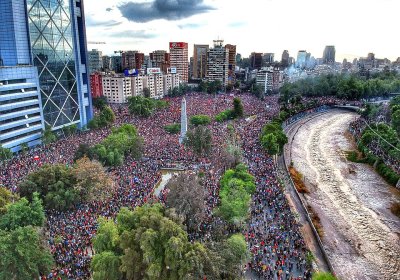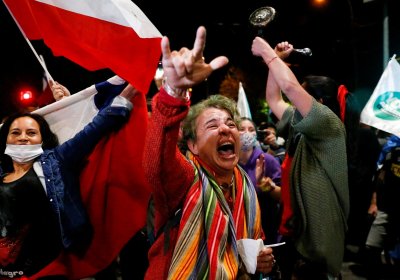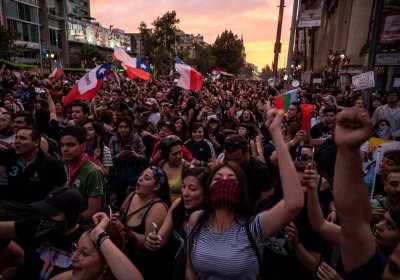Bárbara Navarrete, newly-elected secretary general of the Communist Youth of Chile speaks to Taroa Zúñiga Silva.
2019–2022 Chilean protests
Artist and playwright Jepke Goudsmit presents her impressions of Patricio Guzman's new documentary on Chile's second revolution.
The journey to a new era in Chile has two important paths: the writing of the new constitution and the presidential election on November 21, reports Vijay Prashad.
The elections for Chile’s Constitutional Convention show a huge public desire for true social-political transformation and, crucially, provide the means to achieve it, writes Victor Figueroa Clark.
Independent and progressive candidates won more than a two-thirds majority in the Constitutional Convention, which will draft Chile’s new constitution, reports Tanya Wadhwa.
Seventy-eight percent of Chileans voted “Sí” on October 25 for a new constitution, paving the way for a new era in the country’s history, writes Alan MacLeod.
October 18 marked one year of mass protests for systemic change in Chile, and one year of brutal repression, writes Sandra Cuffe.
After three weeks of protest and social upheaval, people are still taking to the streets in Chile in overwhelming numbers, calling for social justice and demanding dignity.
I have spent a week in Santiago, witnessing first-hand the police use of force and repression.
An armoured vehicle with a water-cannon chased protestors down my hotel’s small street at least twice and multiple tear gas attacks occurred outside my hotel window on several days.
Green Left Weekly’s Nate Thompson and Susan Price spoke to three young Chileans, who have been participating in the mobilisations. Their names have been changed to protect their identities.
I went to Chile because the United Nation's Climate Conference was to be hosted in Santiago. Now, I am an observer of the widespread protests which are calling for President Sebastian Pinera to resign, a new constitution and to address the widespread inequality.
Australian environmentalist John Englart is in Chile due to the United Nations climate conference being originally hosted in Santiago. He now finds himself an observer of the widespread social protest movement calling for the President Sebastian Pinera’s resignation, a new constitution and progress to addressing social inequality.
In part 2 of his series on Chile’s popular revolt, Pablo Leighton looks at the dynamics behind the protest movement and why Chileans won’t return to “normal”.
- Page 1
- Next page











